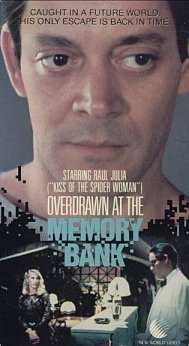Overdrawn at the Memory Bank
Overdrawn at the Memory Bank is a 1983 American television film, starring Raúl Juliá and Linda Griffiths.[1][2][3] It was produced by Canada's RSL Productions in Toronto. Financing was provided by WNET and NJTV, which had hoped to create an entire science fiction series adapting famous works; but, because of lack of funding, this was the last of three productions after The Lathe of Heaven[4] and Between Time and Timbuktu.[5]
| Overdrawn at the Memory Bank | |
|---|---|
 VHS cover for Overdrawn at the Memory Bank | |
| Directed by | Douglas Williams |
| Produced by | Robert Lantos Stephen J. Roth |
| Written by | John Varley (short story) Corinne Jacker (teleplay) |
| Starring | Raúl Juliá Linda Griffiths Wanda Cannon Donald C. Moore Louis Negin Chapelle Jaffe Jackie Burroughs Maury Chaykin |
| Music by | John Tucker |
| Cinematography | Barry Bergthorson |
| Edited by | Rit Wallis |
| Distributed by | New World Video (VHS and Laserdisc) |
Release date |
|
Running time | 83 min. |
| Country | United States |
| Language | English |
The script was based on a 1976 John Varley short story.
Plot
In a future dystopia, Aram Fingal (Raúl Juliá) is a lowly programmer working for Novicorp. Arts are prohibited, and he is caught watching the classic film Casablanca ("scrolling up cinemas") on his workstation. To rehabilitate him, the company transfers his mind ("doppels" him) into a wild baboon (a process which has become routine, with people buying "doppeling vacations"). For a few minutes, Juliá narrates over footage of wild animals, and Fingal begins to enjoy his baboon existence until he finds his peaceful perch in a tree threatened by an elephant shaking it for fruit. He activates an escape clause that is supposed to return his mind to his original body. Unknown to Fingal, however, his body has been maliciously tagged for transfer (by a bored primary-school student touring the facility during its preparation for storage) to a separate wing for a sex change; and, with the computer unable to return him to his body, Fingal's mind must be kept active by storing it in Novicorp's central computer – the HX254 (in graphic form, the HX368 in speech), which controls everything from finances to the weather – until his body is located. His mind can only be maintained in such a way for a limited time before it is destroyed.
Fingal's disappearance is reported to a rival corporation. The news is broadcast worldwide, causing Novicorp's share price to crash. Majority shareholders force Novicorp's Chairman (the film's main antagonist) to divert resources to keep Fingal alive and find his body. Apollonia James (Linda Griffiths), a computer controller, is assigned to locate Fingal and keep him from hacking into Novicorp's mainframe. With Apollonia's help, Fingal creates a virtual world where he encounters characters from Casablanca, including a version of Humphrey Bogart's character, Rick (played also by Raul Juliá). While only minutes pass in the real world, days pass in the virtual one. Rick grows bored, and plots to bring down Novicorp's finances without being removed and killed. Apollonia tries to keep Fingal out of trouble, placing herself in opposition to Novicorp's leaders, especially when she finds herself falling in love with Fingal and develops a conflict of interest.
With Apollonia's considerable help, Fingal eventually "interfaces" with the mainframe and defeats his antagonists. He also returns to his body, which has been discovered before undergoing the aforementioned sex change operation. Finally corporeal and reunited with his accomplice, Fingal has taken complete control of the HX368. After ordering bonuses and stocks for every employee, committing Novicorp's Chairman to a month of "compulsory rehab" via doppeling and changing both his and Apollonia's identity to those of Rick and Ilsa from Casablanca, Fingal vows to fight against the dystopian government. The film ends with the new couple walking out the door and, now free from Novicorp's oppression, talk about opening a club on the other side of town: Rick's Place.
Reception
The production was not a critical success. It has earned a 20% rating on Rotten Tomatoes.[6]
MST3K
It was satirized by Mystery Science Theater 3000 (MST3K) in 1997, complete with a spoof of a public television pledge drive.[7]